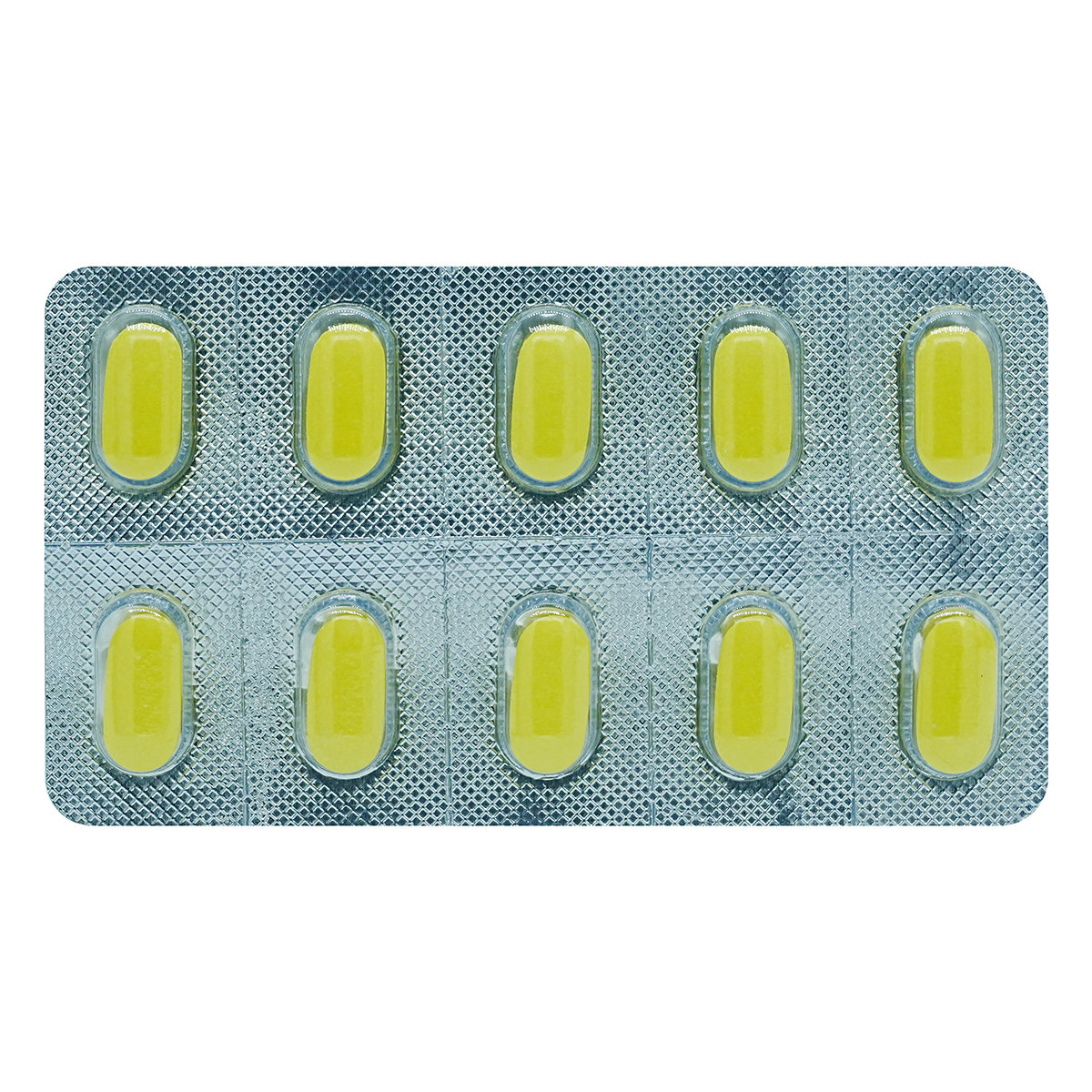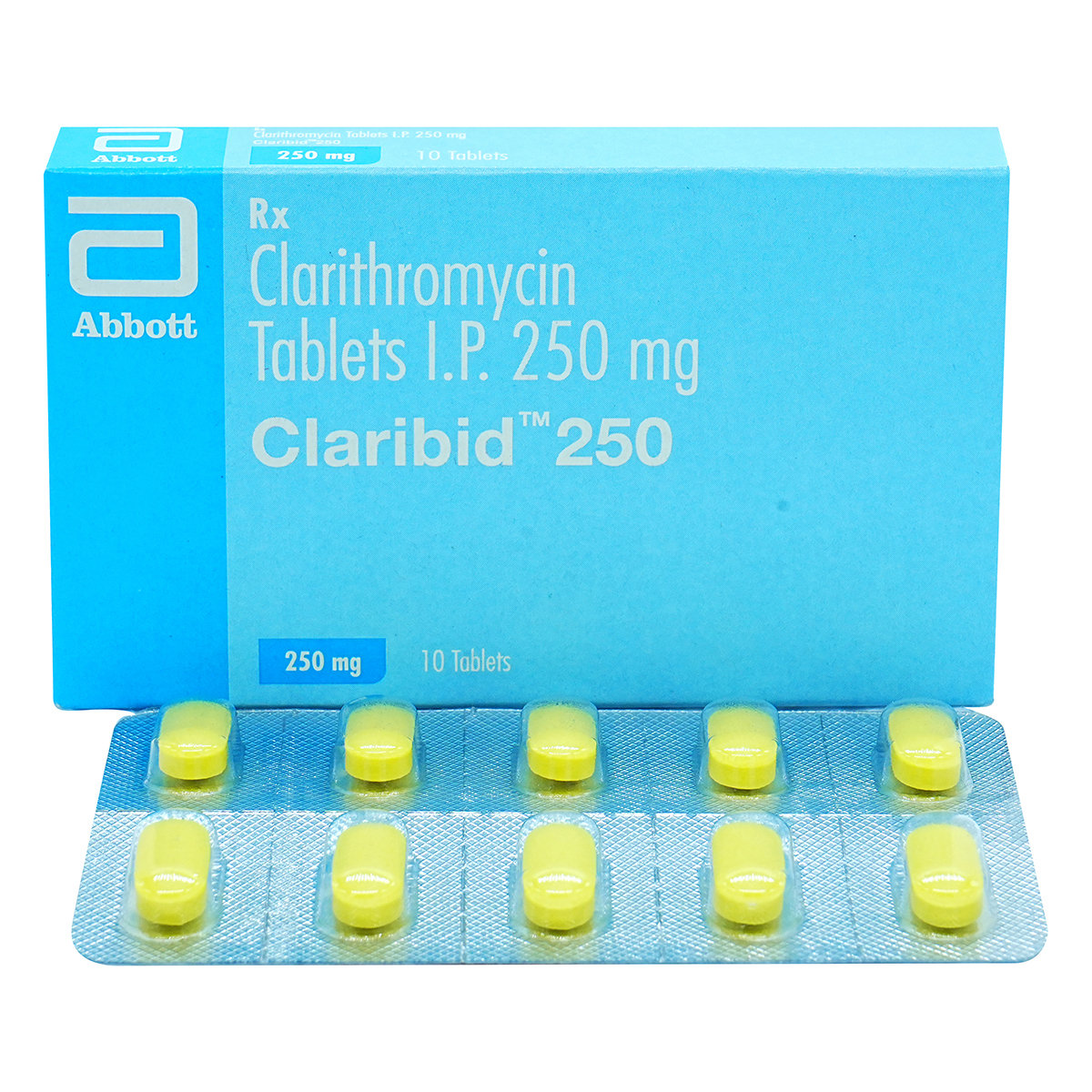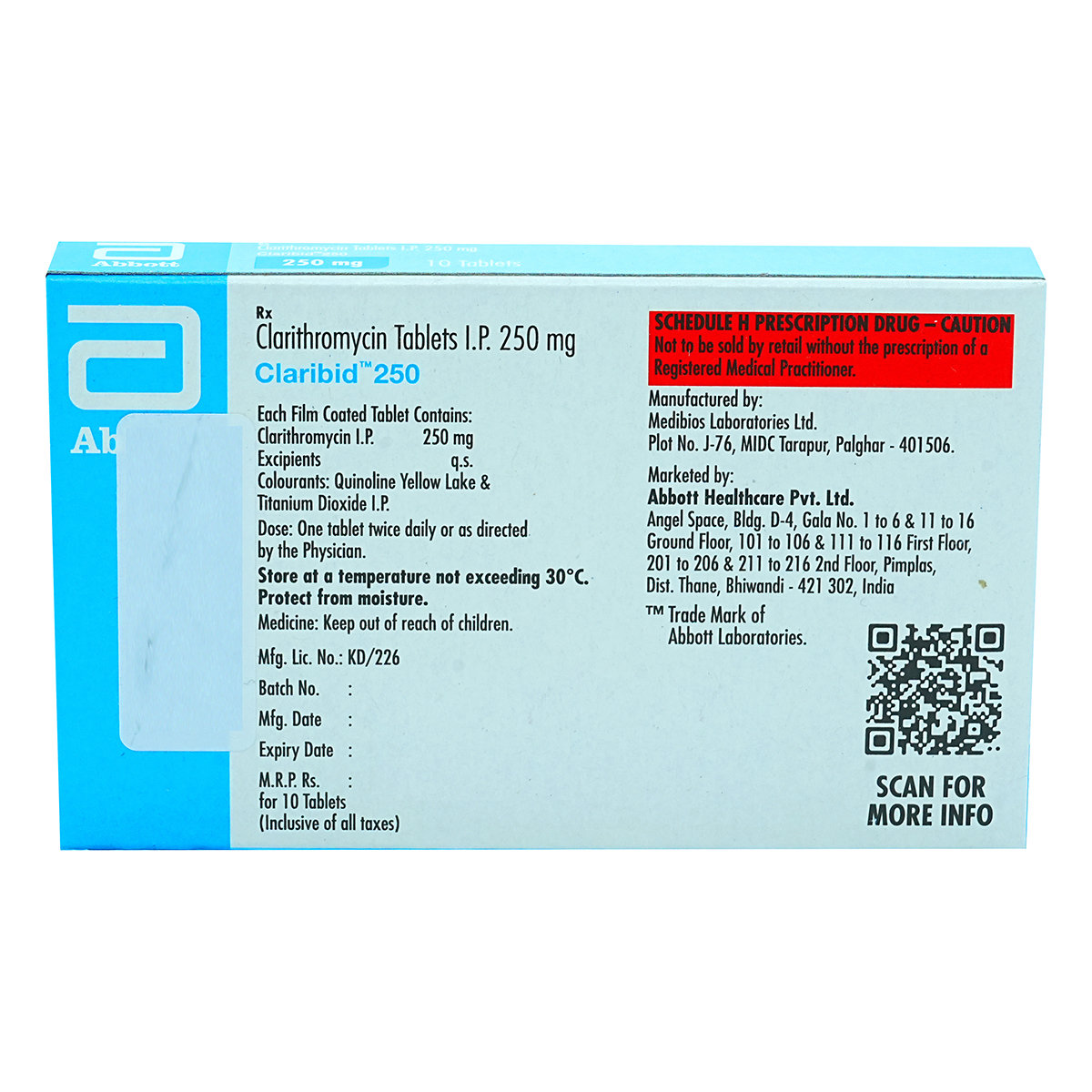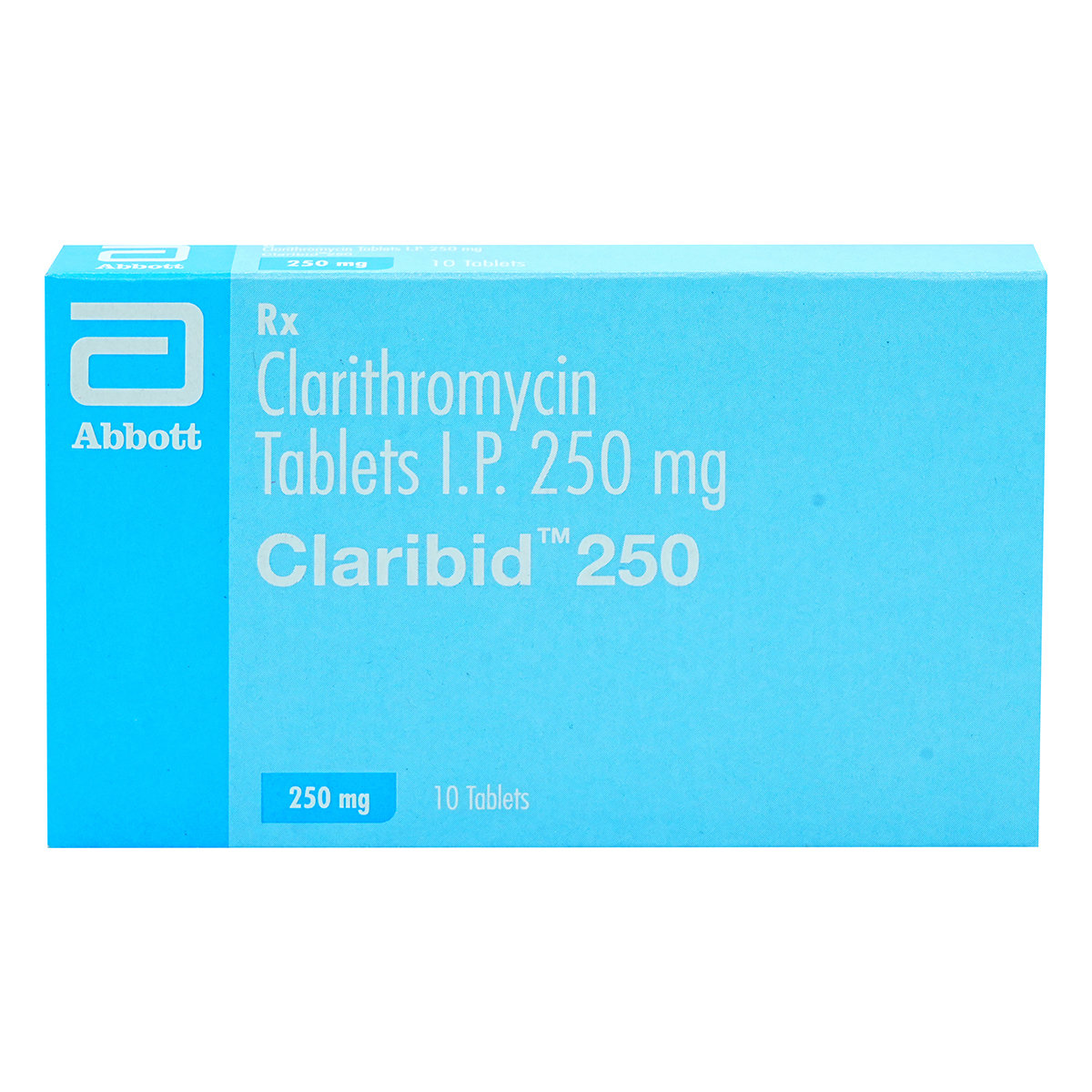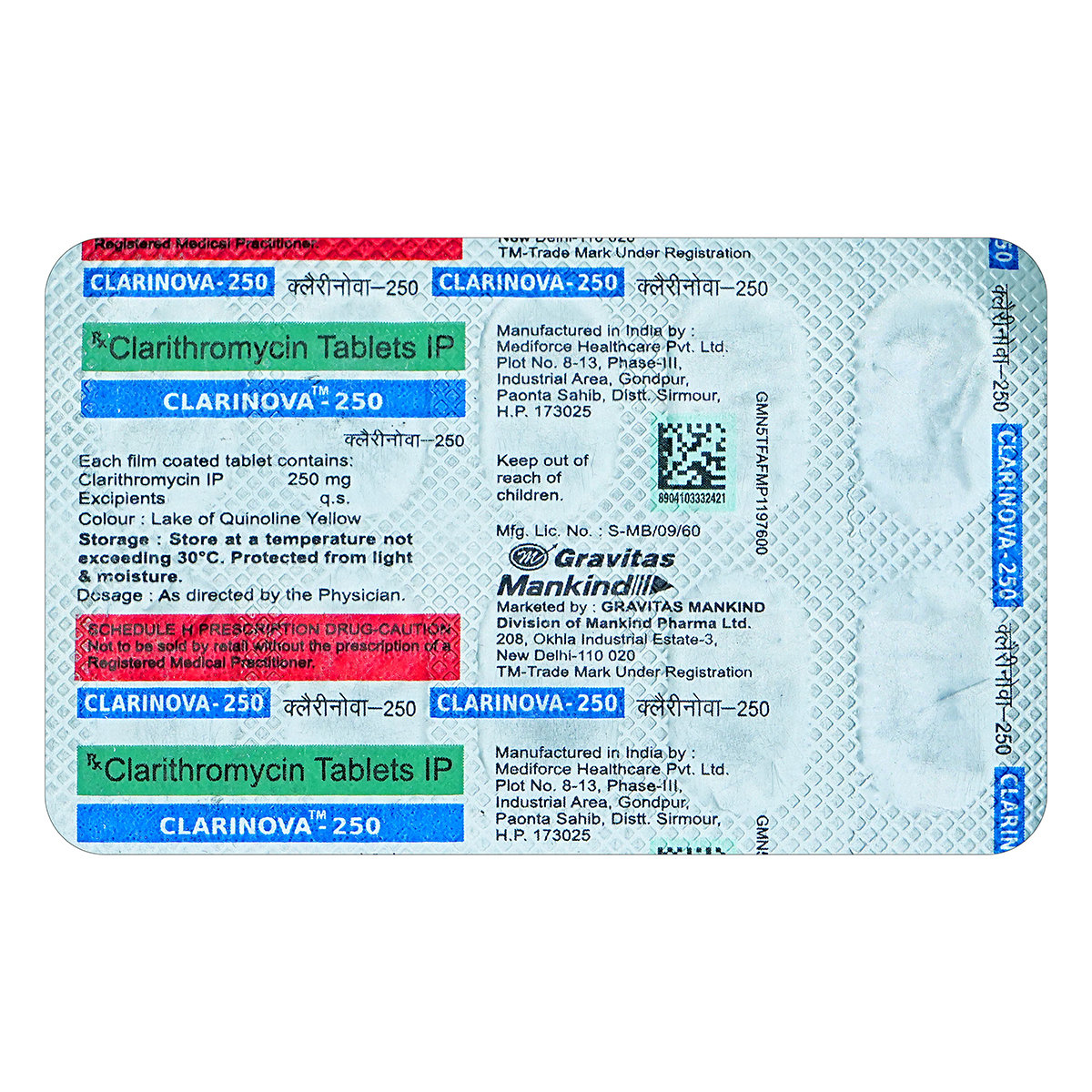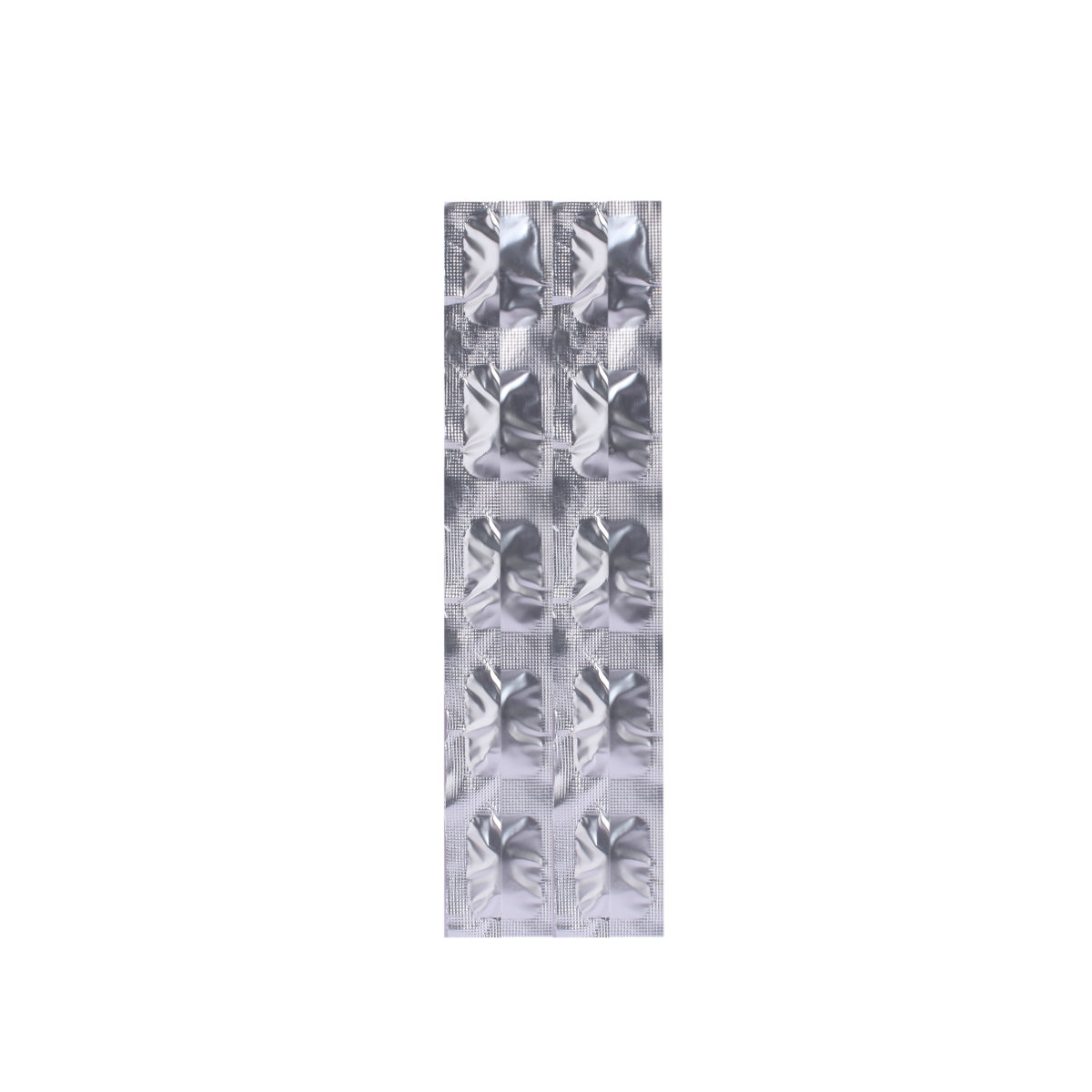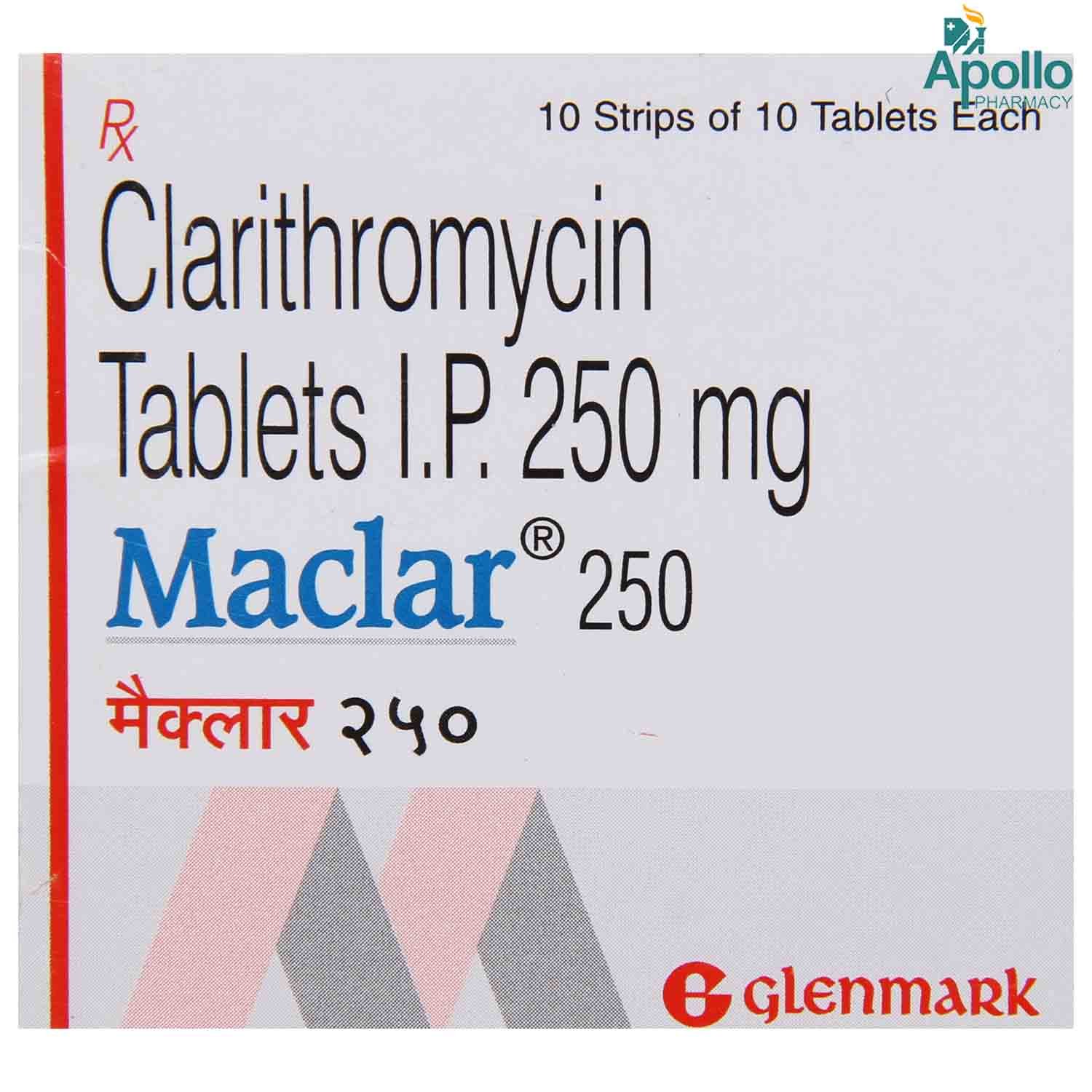Claribid 250 Tablet 10's
MRP ₹257
(Inclusive of all Taxes)
₹38.5 Cashback (15%)
Know Your Delivery Time
Provide Delivery Location

Secure Payment

India's Most Trusted Pharmacy

Genuine Products
Composition :
Manufacturer/Marketer :
Consume Type :
Expires on or after :
Return Policy :
NPPA :
About Claribid 250 Tablet
Claribid 250 Tablet is used to treat bacterial infections, including chest infections such as bronchitis and pneumonia, skin problems such as cellulitis, and ear infections. Besides this, Claribid 250 Tablet is also used in combination with other medicines to treat duodenal ulcers caused by H. pylori.
Claribid 250 Tablet contains Clarithromycin (antibiotic). It inhibits the protein synthesis process required for the growth of the bacterial cell. As a result, bacterial cells are not able to reproduce and grow. Thus, Claribid 250 Tablet helps treat infections.
Claribid 250 Tablet may cause side effects, including nausea, diarrhoea, vomiting, loss of appetite, bloating, indigestion, headaches, and difficulty sleeping. These side effects are temporary and may resolve after some time; however, if they persist, let your doctor know.
Do not take Claribid 250 Tablet if you are allergic to any of its components. Consult your doctor if you are pregnant or breastfeeding. Keep your doctor informed about your health condition and medications to prevent any interactions.
Uses of Claribid 250 Tablet
Claribid 250 Tablet is used in the treatment of Bacterial infections. The detailed uses of Claribid 250 Tablet are as follows:
- Treatment of Respiratory Infections: Claribid 250 Tablet is commonly prescribed to treat respiratory infections such as bronchitis and pneumonia caused by susceptible bacteria.
- Skin Infections: Claribid 250 Tablet effectively treats skin infections like cellulitis or impetigo, caused by bacterial pathogens.
- Sinusitis: Claribid 250 Tablet is used to manage acute bacterial sinusitis, relieving symptoms like nasal congestion and facial pain caused by bacterial infections.
- Otitis Media: Claribid 250 Tablet is frequently utilised to treat middle ear infections (otitis media), providing relief from ear pain and inflammation.

Have a query?
Directions for Use
- Claribid 250 Tablet can be taken with or without food or as advised by your doctor.
- Follow your doctor's instructions on the dosage and timing of this medication.
- Swallow Claribid 250 Tablet as a whole with a glass of water.
- Do not crush, break, or chew it.
Key Benefits
- Claribid 250 Tablet is a macrolide class antibiotic used to treat a wide range of bacterial infections.
- It is effective against both gram-positive and gram-negative bacteria, certain anaerobic organisms, and some parasites such as Balantidium coli and Entamoeba species.
- It is commonly prescribed for chest and lung infections like bronchitis and pneumonia.
- It helps treat bacterial skin infections such as cellulitis.
- It is beneficial in treating middle ear infections and throat infections caused by susceptible bacteria.
- When used in combination with other drugs, Claribid 250 Tablet aids in eradicating Helicobacter pylori, the bacteria responsible for duodenal ulcers.
- By stopping the growth and multiplication of bacteria, Claribid 250 Tablet helps clear infections and promotes faster recovery.
How Claribid 250 Tablet Works
Storage
- Drink plenty of fluids and consider oral rehydration solutions.
- Eat bland, easily digestible foods like bananas, rice, toast, and applesauce.
- Avoid trigger foods like greasy, spicy, fatty, acidic, and caffeinated foods.
- Gradually reintroduce fiber-rich foods as symptoms improve.
- Get adequate sleep and rest.
- Practice relaxation techniques to manage stress.
- Maintain regular bowel habits.
- Avoid overexertion and take breaks when needed.
- Consult a doctor if your gastrointestinal symptoms are severe, persistent, or accompanied by fever, bloody stools, dehydration, or last for more than a few days.
- Regularly brush and floss your teeth.
- Rinse your mouth with water and baking soda a solution to neutralize acid in the mouth. This makes your food taste as it should.
- Drink plenty of water or non-caffeinated drinks to prevent dry mouth which may lead to altered taste.
- Try ginger, peppermint, fruit or green teas, lemonade, ginger ale or fruit juice to help mask unpleasant tastes.
- Try sucking on sugar-free ice pops or ice cubes to prevent dry mouth.
- Inform Your Doctor: Notify your doctor immediately about your diarrhoea symptoms. This allows them to adjust your medication or provide guidance on managing side effects.
- Stay Hydrated: Drink plenty of fluids to replace lost water and electrolytes. Choose water, clear broth, and electrolyte-rich drinks. Avoid carbonated or caffeinated beverages to effectively rehydrate your body.
- Follow a Bland Diet: Eat easy-to-digest foods to help firm up your stool and settle your stomach. Try incorporating bananas, rice, applesauce, toast, plain crackers, and boiled vegetables into your diet.
- Avoid Trigger Foods: Steer clear of foods that can worsen diarrhoea, such as spicy, fatty, or greasy foods, high-fibre foods, and dairy products (especially if you're lactose intolerant).
- Practice Good Hygiene: Maintain good hygiene to prevent the spread of infection. To stay healthy, wash your hands frequently, clean and disinfect surfaces regularly, and avoid exchanging personal belongings with others.
- Take Anti-Diarrheal Medications: If your doctor advises, anti-diarrheal medications such as loperamide might help manage diarrhoea symptoms. Always follow your doctor's directions.
- Keep track of your diarrhoea symptoms. If they don't get better or worse or are accompanied by severe stomach pain, blood, or dehydration signs (like extreme thirst or dark urine), seek medical help.
- Inform your doctor about the nausea and discuss possible alternatives to the medication or adjustments to the dosage.
- Divide your daily food intake into smaller, more frequent meals to reduce nausea.
- Opt for bland, easily digestible foods like crackers, toast, plain rice, bananas, and applesauce.
- Avoid certain foods that can trigger nausea, such as fatty, greasy, spicy, and smelly foods.
- Drink plenty of fluids, such as water, clear broth, or electrolyte-rich beverages like coconut water or sports drinks.
- Use ginger (tea, ale, or candies) to help relieve nausea.
- Get adequate rest and also avoid strenuous activities that can worsen nausea.
- Talk to your doctor about taking anti-nausea medication if your nausea is severe.
- Record when your nausea occurs, what triggers it, and what provides relief to help you identify patterns and manage your symptoms more effectively.
- Preventing Vomiting (Before it Happens)
- Take medication exactly as prescribed by your doctor. This can help minimize side effects, including vomiting.
- Having a small meal before taking your medication can help reduce nausea and vomiting.
- Talk to your doctor about taking anti-nausea medication along with your prescribed medication.
- Managing Vomiting (If it Happens)
- Try taking ginger in the form of tea, ale, or candy to help alleviate nausea and vomiting.
- What to Do if Vomiting Persists
- Consult your doctor if vomiting continues or worsens, consult the doctor for guidance on adjusting your medication or additional treatment.
- Drink water or other clear fluids.
- To prevent worsening of pain, limit intake of tea, coffee, or alcohol.
- Include bland foods like rice, toast, crackers, and rice in your diet.
- Avoid lying down immediately after eating as it may cause indigestion or heartburn.
- Avoid acidic and spicy food as it may cause indigestion.
- Skin rash caused by allergies is due to irritants or allergens. Therefore, avoid contact with such irritants.
- Consult your doctor for proper medication and apply an anti-itch medication. Follow the schedule and use the medication whenever needed.
- Protect your skin from extreme heat and try to apply wet compresses.
- Soak in the cool bath, which gives a soothing impact to the affected area.
What if I have taken an overdose of Claribid 250 Tablet
Drug Warnings
- Avoid taking Claribid 250 Tablet if you are allergic to any of the components present in it.
- In some cases, the use of Claribid 250 Tablet causes antibiotic-associated diarrhoea.
- Claribid 250 Tablet may cause sensitive skin to react to sunlight and ultraviolet rays, leading to an exaggerated sunburn reaction. Hence, it is advisable to apply sunscreen before going outside.
- Consult your doctor if you are pregnant or breastfeeding.
- Let your doctor know if you are taking any other medicines, including supplements or herbal products.
Drug-Drug Interactions
Drug-Drug Interactions
Login/Sign Up
Co-administration of Droperidol with Claribid 250 Tablet can increase the risk of an irregular heart rhythm.
How to manage the interaction:
Taking Claribid 250 Tablet with Droperidol can result in an interaction, it should be taken only if a doctor has advised it. However, if you experience dizziness, lightheadedness, fainting, shortness of breath, or heart palpitation, contact a doctor immediately. Do not discontinue any medications without consulting a doctor.
The combination of Alprazolam and Claribid 250 Tablet may considerably increase the risk of side effects.
How to manage the interaction:
Despite the fact that there is an interaction between Alprazolam and Claribid 250 Tablet, it can be used if prescribed by a doctor. Consult a doctor if you have excessive drowsiness, problems with movement, memory loss, anxiety, hallucinations (illogical thoughts), or breathing issues (particularly if you have asthma or obstructive sleep apnea). Do not discontinue any medications without consulting a doctor.
When Dronedarone is taken with Claribid 250 Tablet, can increase the blood levels of dronedarone and cause an irregular heart rhythm that may be serious.
How to manage the interaction:
Taking Claribid 250 Tablet with Dronedarone can result in an interaction, it should be taken only if a doctor has advised it. However, if you experience dizziness, lightheadedness, fainting, shortness of breath, or heart palpitation, contact a doctor immediately. Do not discontinue any medications without consulting a doctor.
When Quinidine is taken with Claribid 250 Tablet, can increase the blood levels and effects of Quinidine. This may increase the risk of an irregular heart rhythm.
How to manage the interaction:
Co-administration of Claribid 250 Tablet and Quinidine can lead to an interaction, it can be taken if advised by a doctor. You should seek immediate medical attention if you develop sudden dizziness, lightheadedness, fainting, shortness of breath, or fast or pounding heartbeats. However, if you experience any symptoms like headache, confusion, vomiting, diarrhea, ringing in the ears, hearing loss, blurred or double vision, or sensitivity to light, consult a doctor immediately. Do not stop using any medications without a doctor's advice.
When Naloxegol is taken with Claribid 250 Tablet, the amount of Naloxegol in the blood can go up.
How to manage the interaction:
Co-administration of Claribid 250 Tablet and Naloxegol can lead to an interaction, it can be taken if advised by a doctor. However, if you experience any symptoms like sweating, tearing, runny nose, chills, diarrhea, abdominal pain, anxiety, insomnia, irritability, restlessness, and yawning, consult a doctor immediately. Do not stop using any medications without a doctor's advice.
When Tolvaptan and Claribid 250 Tablet are taken together, may significantly increase the blood levels and effects of Tolvaptan.
How to manage the interaction:
There may be a possibility of interaction between Tolvaptan and Claribid 250 Tablet, but it can be taken if prescribed by a doctor. If you notice any of these signs -difficulty swallowing, trouble speaking, muscle weakness, trouble controlling body movements, confusion, mood changes, seizures, call a doctor right away. Do not stop using any medications without a doctor's advice.
When Terfenadine is taken with Claribid 250 Tablet, the amount of Terfenadine in the blood can go up.
How to manage the interaction:
Co-administration of Claribid 250 Tablet and Terfenadine can lead to an interaction, it can be taken if advised by a doctor. However, if you experience any symptoms like dizziness, lightheadedness, fainting, shortness of breath, or heart palpitations, consult a doctor immediately. Do not stop using any medications without a doctor's advice.
When Ranolazine and Claribid 250 Tablet are taken together, significantly increases the blood levels and effects of Ranolazine.
How to manage the interaction:
Co-administration of Claribid 250 Tablet and Ranozaline can lead to an interaction, it can be taken if advised by a doctor. Do not stop using any medications without a doctor's advice.
When Flibanserin is taken with Claribid 250 Tablet, it can slow down the way Flibanserin is broken down in the body.
How to manage the interaction:
Co-administration of Claribid 250 Tablet and Flibanserin can lead to an interaction, it can be taken if advised by a doctor. However, if you experience any symptoms like excessive drowsiness and decreases in blood pressure that can lead to dizziness, lightheadedness, or fainting, consult a doctor immediately. Do not stop using any medications without a doctor's advice.
When Astemizole is taken with Claribid 250 Tablet, it can cause a decrease in the metabolism of Astemizole.
How to manage the interaction:
Taking Claribid 250 Tablet with Astemizole is not recommended, please consult your doctor before taking it.
Drug-Food Interactions
Drug-Food Interactions
Login/Sign Up
Grapefruit Juice
How to manage the interaction:
Grapefruit juice may delay the gastrointestinal absorption of Claribid 250 Tablet. Avoid grapefruit juice while on treatment with Claribid 250 Tablet.
Diet & Lifestyle Advise
- Probiotics and prebiotics can also help to reduce the side effects of antibiotics.
- Include more fibre-enriched food in your diet, as it can be easily digested by your gut bacteria, which helps stimulate their growth. Thus, fibre foods may help restore healthy gut bacteria after a course of antibiotics. Whole grains like whole-grain bread and brown rice should be included in your diet.
- Eating grapefruit during antibiotic treatment can prevent the body from utilising Claribid 250 Tablet properly. So, avoid intake of grapefruit or grapefruit juice with the antibiotic.
- Avoid taking too much calcium, iron-enriched foods and drinks as it might affect the working of Claribid 250 Tablet .
- Avoid the intake of alcoholic beverages, as it can make you dehydrated and affect your sleep. This can make it harder for your body to aid the medicine in fighting off infections.
Habit Forming
Therapeutic Class
All Substitutes & Brand Comparisons
RX
Clarinova-250 Tablet 10's
Mankind Pharma Pvt Ltd
₹197.5
(₹17.78 per unit)
23% CHEAPERRX
Clarigard 250 Tablet 10's
Macleods Pharmaceuticals Ltd
₹199
(₹17.92 per unit)
22% CHEAPERRX
Maclar 250 Tablet 10's
Glenmark Pharmaceuticals Ltd
₹199
(₹17.92 per unit)
22% CHEAPER
Alcohol
Safe if prescribed
Limited information is available. Keep your doctor informed if you drink alcohol.
Pregnancy
Consult your doctor
Claribid 250 Tablet should be used in pregnant women only if clinically needed, and the benefits outweigh the risks.
Breast Feeding
Consult your doctor
Let your doctor know if you are a nursing mother before taking Claribid 250 Tablet ; your doctor will decide whether Claribid 250 Tablet can be taken by breastfeeding mothers or not.
Driving
Safe if prescribed
Not enough scientific data available, hence it is advised to consult your doctor.
Liver
Consult your doctor
Claribid 250 Tablet to be taken with caution, especially if you have a history of liver diseases/conditions. The dose may have to be adjusted by your doctor.
Kidney
Consult your doctor
Claribid 250 Tablet to be taken with caution, especially if you have a history of kidney diseases/conditions. The dose may have to be adjusted by your doctor.
Children
Safe if prescribed
Claribid 250 Tablet can be given safely to children above 6 months of age, with the dose to be adjusted and recommended by a child specialist only.
Heart
Caution should be exercised while taking Claribid 250 Tablet in patients with heart disease. Inform your physician on priority if you/your child have chest discomfort, palpitations or irregular heartbeat. Your physician may adjust the dose of the medicine based on your health condition.
Geriatrics
Consult your doctor
Claribid 250 Tablet is safe for use in geriatric patients if recommended by the physician. Your doctor will decide the dose and duration of medicine.<br />
FAQs
Claribid 250 Tablet is used to treat bacterial infections, including chest infections, skin infections, and ear infections. Besides this, Claribid 250 Tablet is also used in combination with other medicines to treat duodenal ulcers caused by H. pylori.
Claribid 250 Tablet contains Clarithromycin (antibiotic). It inhibits the protein synthesis process required for the growth of the bacterial cell. As a result, bacterial cells are not able to reproduce and grow. Thus, Claribid 250 Tablet helps in the prevention of infections.
You should avoid taking iron supplements, multivitamins, calcium supplements, antacids, or laxatives within 2 hours before or after taking Claribid 250 Tablet . Avoid taking any other antibiotics containing Claribid 250 Tablet unless your doctor has prescribed you.
After taking antibiotics such as Claribid 250 Tablet , some people get thrush, a fungal infection. This is due to the fact that antibiotics kill the regular, harmless bacteria that serve to protect you from thrush.
Claribid 250 Tablet treats only bacterial infections. It will not work for viral infections (such as the common cold, flu).
No, Claribid 250 Tablet is a macrolide antibiotic. It can be taken by people who are allergic to penicillin with a doctor's advice only.
Side effects are rare with Claribid 250 Tablet and do not usually last long. They will get better after a day or two. If any side effects persist, reach out to the doctor immediately.
No, Claribid 250 Tablet should not be stopped even if you feel better, as it is an antibiotic medication and completing the full course is very necessary; otherwise, the infection might reappear in a more severe form.
Country of origin
Manufacturer/Marketer address
Disclaimer
Author Details
We provide you with authentic, trustworthy and relevant information


